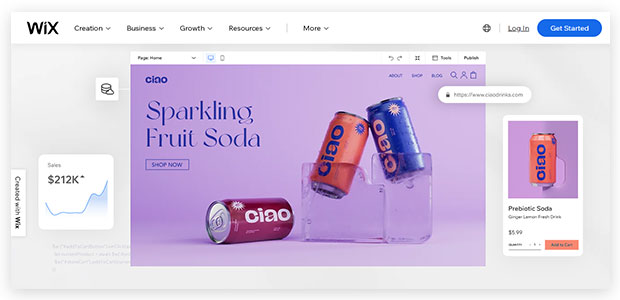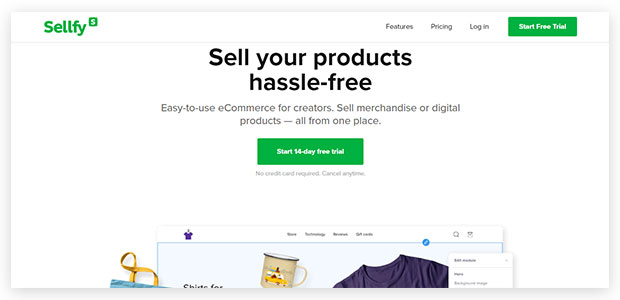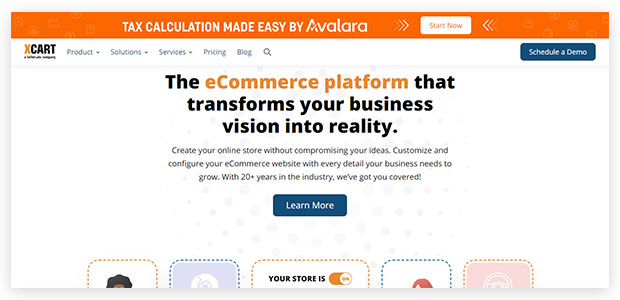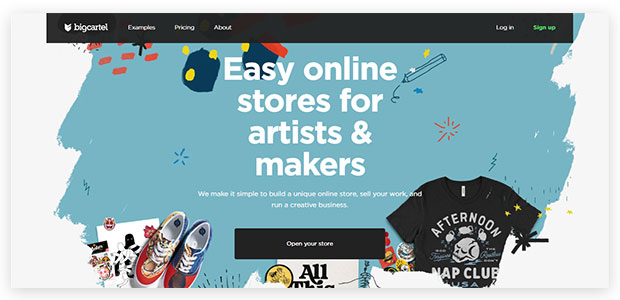There is a lot of hype about Shopify but is this the right platform for your store?
Today, numerous merchants sell through Shopify. And while this is probably one of the best-hosted eCommerce solutions available today, there are many reasons why you should consider moving or switching to another platform or opening your store on another platform.
For example, if you don’t want to deal with sales commissions or your budget is relatively small, you can find a Shopify alternative that’s more suitable for your business.
However, when it comes to e-commerce platforms, there are many options with varying degrees of functionality.
In this blog, you will find the best Shopify alternatives, their strengths, and their weaknesses.
Why choose Shopify?
Shopify is an eCommerce platform that lets anyone set up their online store and sell their products.
It is excellent news for brands that want to avoid building websites from scratch, managing updates, and managing maintenance alone.
With Shopify, you can create a custom website, manage your product inventory, and sell your products across multiple channels, all without having to do the back-end maintenance required to maintain the software.
Before we go any further, let’s first look at the pros and cons of Shopify.
Contents
Pros of Shopify
- Ease of Use: Shopify is a simple eCommerce website builder, despite having many features.
- Apps & Communities: The Shopify app store is full of free and paid solutions so that you can extend functionality with chat, digital products, and more.
- Template Selection: Shopify offers a selection of over 170 professionally designed templates. You can also build it yourself using the Liquid programming language.
- Support: It has a 24/7 support team which creates a win-win situation.
- Scalability: Shopify is a robust platform that scales very well with features like Shop Pay and Shopify Markets, which gives you access to all products sold internationally.
Cons of Shopify
- Transaction fees: Technically, you don’t have to pay anything extra when you use Shopify Payments. But it still needs to be made available worldwide.
- Create regular content: Good for product pages, not for blog pages. There are options, but Shopify takes a store-based approach that can frustrate experienced web admins.
- Shopify SEO: Shopify comes with some SEO restrictions that other eCommerce platforms don’t have.
Let us now look at the 15 best Shopify alternatives to consider in 2025.
15 Best Shopify Alternatives for your business
1. WooCommerce

WooCommerce is easy to use, easy to install, and very flexible. It is an excellent open-source platform for building online stores and the most popular e-commerce plugin for WordPress.
Here are some pros and cons of using WooCommerce:
Pros:
- It’s free: WooCommerce is free to download or install. Hosting your site on a domain name costs money, but that cost is roughly the same whether you use WooCommerce or another open-source e-commerce platform.
- WooCommerce is open source: You can see the plugin code, making it easier to change if needed.
- You can sell anything: If you have inventory to sell, product feeds from your suppliers, and a little technical know-how, you can create an online store with WooCommerce. It works with any theme and integrates with most extensions that make your site more functional or add features.
Cons:
- Even though the WooCommerce plugin is free, you still need to consider domain hosting, SSL certificates, and additional plugin costs.
- Since WooCommerce is open source, you may need designers and developers to help with CSS and HTML to get the most out of it.
- Just like Shopify, adding some features to your store requires more plugins, which can slow down your site over time.
Pricing: WooCommerce is open-source and free to use. However, there are still some costs when running your WooCommerce store. Since this is a plugin, you need a WordPress site to use WooCommerce. So you have hosting costs.
While it provides standard store themes for free, you can also purchase new themes. Themes typically cost between $0 and $100 per year. Additionally, selecting reliable web hosting for WooCommerce is crucial to ensure your store runs smoothly and efficiently.
2. BigCommerce

BigCommerce is an excellent choice if you want a simple drag-and-drop editor that makes it flexible for setting up your website.
The platform has some great themes, although only seven are free for all industries. You have to pay for the premium, which makes it better than Shopify in terms of customization.
A simple solution to this is adopting headless BigCommerce, which not only enhances your storefront customization capabilities but also improves website speed significantly
Pros:
- Various integrated drag-and-drop visual editing tools
- Multi-channel sales
- Several free apps and features to choose from, including an in-app payment feature for Instagram.
- Fully customizable URLs and SEO features
- Suitable for different business models
Cons:
- Pricing can seem complicated if you are a new user
- Quite difficult to prepare
- Only five free themes
- The speed is not constant
Pricing: Prices start at $29.95 per month for the basic plan and go up to $299.95 per month.
3. Volusion

Volusion is an e-commerce platform aimed at small and medium-sized businesses that need an easy-to-use solution. A simple interface and a step-by-step guide make it easy to create your first store.
Pros:
- Simple interface
- An interactive step-by-step guide to help you get started
- Multi-channel trading is supported
Cons:
- Advanced features are only included in Business Plan
- Limited integration
Pricing: Volusion starts at $29 per month for a personal plan that covers up to 100 products and $50,000 in annual sales. You’ll need to upgrade to the $79/month professional plan for phone sales and CRM.
4. Magento

You may have already heard of Magento. Magento is suitable for beginners as well as established store owners and has a large and popular community worldwide.
The price makes it easy to see why Magento is so popular. Pricing is similar to WooCommerce, making it one of the best alternatives to Shopify. While the content management software is free of cost, you have to pay for hosting, themes, and plugins.
However, Magento is primarily a platform that focuses on selling all your products through an open-source ecosystem, which is excellent for businesses looking to scale their operations.
Pros:
- It is very flexible and extensible
- Advanced features with over 250,000 developers
- Multiple options for using secure payment gateways
- Lots of add-ons and extensions to choose from
- Excellent community support
Cons:
- Programming knowledge and technical skills are essential to take full advantage of open-source options.
- New users may find it challenging
- Too expensive
Pricing: $10 to $50
5. PinnacleCart

PinnacleCart advertises itself as the sales and conversion leader in the e-commerce platform market. It is an excellent choice for store owners who need help in this area with their design and marketing services.
Pros:
- It includes SEO tools and other advanced marketing features.
- The interface is easy to use.
- Unlimited products for all plans.
Cons:
- Limited integration
- The standard plan includes only 20 GB of bandwidth.
Pricing: PinnacleCart’s standard plan is $79.95 per month and includes all features, unlimited products, and $250,000 in sales. Hosting is limited to 10 GB of disk space and 20 GB of bandwidth.
6. Zyro

According to Shopify’s competitors, Zyro is a low-cost alternative that offers similar features at a lower price. With the Advanced Store plan, monthly costs are lower than Shopify Basic.
Like Shopify, it offers a drag-and-drop page builder, an app market for additional features, and a variety of themes to choose from.
Pros:
- AI tools make website, content, and logo design more accessible.
- You sign up for a plan at a reasonable price with a more significant discount
- No transaction fees
- 30-day money-back guarantee
Cons:
- Multi-channel sales and abandoned cart recovery are only available on the store’s Advanced plan.
- Slow mobile speed
Pricing: Basic plans start at $5 per month, and advanced plan starts at $15.90 per month.
7. Shift4Shop

3DCart was acquired by Shift4 in 2020 and is now known as Shift4Shop.
It’s a very welcoming platform for e-store users. There are many reasons why Shift4Shop is one of the best Shopify alternatives.
You also get the use of Facebook, unique features, and an excellent web hosting service that provides you with SSL certificates at a reasonable price.
However, the service could be faster, and there is little difference in the themes.
Pros:
- Support for many standard payment gateways
- Great transaction speed
- Customization can be done using HTML and CSS
- It is affordable for both beginners and large companies.
Cons:
- The service is slow
- The support rating is not high
- You may experience problems while updating.
- It is challenging to set up for beginners.
Pricing: The price starts at $29/month and goes up to $229/month. You get SEO tools, email marketing campaigns, and exceptional products for this price.
8. Simvoly

Simvoly is a tool for creating websites and advertising that supports e-commerce and online stores. It is an excellent choice for entrepreneurs and businesses who are used to working with ClickFunnels or special programs but also want to create an online store with many products.
Pros:
- Strong checkout flow to maximize Average order value (AOV).
- It’s a natural and powerful drag-and-drop construction tool.
- Easy to use
Cons:
- Limited eCommerce controls
- Limited e-commerce and marketing analytics
Pricing: The personal plan only supports five products, 20 locations, and 10GB of bandwidth but costs only $12 per month.
The business plan is a reasonable $24 per month with unlimited sites, up to 100 products, and 60GB of bandwidth.
9. Wix

Wix helps you achieve everything you need with affordable plans in an easy-to-use interface. It has more than 100 intelligent models, many applications, highly customizable theme options, and a beautiful design as a solution for beginners and users.
Wix gives you two ways to set up your website – ADI is an automatic assistant that suggests ads based on your answers to your question. The Wix editor, on the other hand, allows a whole user experience and customization and is primarily drag-and-drop, which means you can place anything anywhere on your website.
The Wix App Store has 280+ apps, plugins, extensions for social media integration, live chat, payment gateways, coupons, and more. You can also add HTML code and light boxes and use different button styles – for a reasonable price, Wix has the edge over Shopify.
Pros:
- Drag-and-drop editor
- Unique designs, 100+ designs
- It works with many third-party payment gateways
Cons:
- Bandwidth restrictions
- Limited Apps as compared to Shopify
Pricing: The $5/month plan comes with 1GB of bandwidth and 500MB of storage, and the ability to connect to standard servers, making it a popular choice for many online businesses. The $16.50/month Wix eCommerce plan includes 10GB of bandwidth and 20GB of storage, a free domain name, and some extras.
10. Squarespace

Squarespace creates excellent, elegant, and beautiful websites. It has a fantastic website-building tool and gives you numerous templates to choose from.
Pros:
- Outstanding Blog – Benefit from powerful blogging features and easy e-commerce integration.
- Express Checkout – Offers a fast checkout process.
- It offers excellent SEO.
- It has a fantastic bunch of templates.
Cons:
- It is not an easy software to use
- While Squarespace has a library of extensions, Shopify is more robust in this department with its App Store.
Pricing: Prices range from $23 to $49 based on your plans.
11. OpenCart

OpenCart is a free Shopify alternative with a slightly updated platform that allows you to create a professional website that you can customize to your needs.
The documentation is vital, and it has a solid user base. It also supports thousands of third-party plugins and modules that most e-commerce customers want.
Pros:
- Very good for most online stores
- It is very flexible
- Speedy installation
- It supports multiple payment gateways
Cons:
- Not as easy to use as Shopify
- Support and documentation are not easy
- It’s not the most accessible platform to use
- Not as many plugins as Shopify
Pricing: It offers a free plan and a free trial. Paid plans start from $99/month.
12. Sellfy

Sellfy is an e-commerce platform that focuses on selling digital products. Great for artists selling photos, music, or video tutorials. Like Shopify, it’s a cloud-based solution with monthly subscription fees and separate credit card processing fees.
And just like Shopify offers a Lite package with a buy button, Sellfy offers an essential solution for adding products and buy buttons to existing websites.
Pros:
- Automatic payments and product downloads save your time
- It includes all the tools you need to run your eCommerce store
Cons:
- It only works with two processors – PayPal and Stripe
- Limited design options
- Expensive for the functionality it offers
Pricing: It offers a 14-day free trial; no credit card is required. Prices vary from $29 to $129 per month ($19 to $89 per month for annual plans).
13. X-cart

X-Cart, developed by Qualiteam, is fast, compact, and easy to use.
It is a one-stop solution for your e-commerce needs and has various features.
This powerful platform offers unlimited customization options, and experienced developers can easily use it to create great stores, making it a viable Shopify alternative.
But remember that the company may only offer a little support if there is a problem. They blame the problem on your server, leaving you to fix the problem.
Pros:
- It has several advanced features
- Easy to install and use
Cons:
- X-cart manufacturers are hard to find and can be very expensive
- Companies usually blame problems on your server
Pricing: Prices start at $199 per month and go up to $399 per month. You get additional features as you move up the ladder in the package.
14. The big cartel

Big Cartel is a simple e-commerce solution for artists, designers, and influencers. Its limited features make it easy to use but unsuitable for established businesses and stores.
Pros:
- Simple and easy to use.
- Free bundles (up to 5 products) are available.
- Cheaper than other options
Cons:
- Restricted access.
- They have limited commercial features and applications.
- Lack of analysis and testing
Pricing: Paid plans start at $9.99 per month for 50 products and include all features, tracking, and discounts.
15. Ecwid

Unlike the other eCommerce store builder platforms on this list, you can use Ecwid’s store builder plugin with an existing website.
In addition, it does not require additional transaction fees, making it one of the cheapest e-commerce solutions.
Pros:
- Easy to navigate and use
- There are no transaction fees.
- A good option if you already have a website
- It integrates with marketplaces like Amazon and allows you to sell on social media (Facebook, Instagram, etc.).
Cons:
- While Ecwid is an excellent platform if you already have a website, there are better solutions than this if you plan to build a website using it. It’s just a simple store builder, nothing else.
- Limited design options
- Lack of support for third-party tools
Pricing: Ecwid offers a free plan with ten items and limited features. Paid plans start at $15 per month.
Conclusion
Shopify is the obvious choice for e-commerce, but you may outgrow it at some point or need a more flexible solution. In our experience, BigCommerce is Shopify’s most potent competitor for growing startups; WooCommerce is the best for WordPress-based stores.
All of these are ideal for creating a successful online store.
Finding a Shopify alternative is about something other than making the best or worst choice but about understanding your needs, skills, and budget. With this, you can easily choose the platform that fits the niche that is right for your online business.
For any solution regarding Marketing Automation, email marketing, SMS marketing, and A/B testing, you can schedule a demo with NotifyVisitors.
FAQs
Q1. What is Shopify?
Shopify is an e-commerce platform that allows you to create a feature-rich online store for your potential customers to sell your products online and offline using Shopify POS.
Q2. Are there free alternatives to Shopify?
While Shopify is a great platform, other free alternatives like WooCommerce and Magento offer similar feature sets with minimal operating costs.
Q3. Is WooCommerce better than Shopify?
Woocommerce offers advanced SEO-specific options and is better for you if you want to create a large-scale online store with a more extensive selection of products. You can improve SEO with AB Testing. If you are a beginner, Shopify is the right choice for you. Woocommerce offers greater flexibility even in terms of pricing.

























 Email
Email SMS
SMS Whatsapp
Whatsapp Web Push
Web Push App Push
App Push Popups
Popups Channel A/B Testing
Channel A/B Testing  Control groups Analysis
Control groups Analysis Frequency Capping
Frequency Capping Funnel Analysis
Funnel Analysis Cohort Analysis
Cohort Analysis RFM Analysis
RFM Analysis Signup Forms
Signup Forms Surveys
Surveys NPS
NPS Landing pages personalization
Landing pages personalization  Website A/B Testing
Website A/B Testing  PWA/TWA
PWA/TWA Heatmaps
Heatmaps Session Recording
Session Recording Wix
Wix Shopify
Shopify Magento
Magento Woocommerce
Woocommerce eCommerce D2C
eCommerce D2C  Mutual Funds
Mutual Funds Insurance
Insurance Lending
Lending  Recipes
Recipes  Product Updates
Product Updates App Marketplace
App Marketplace Academy
Academy

